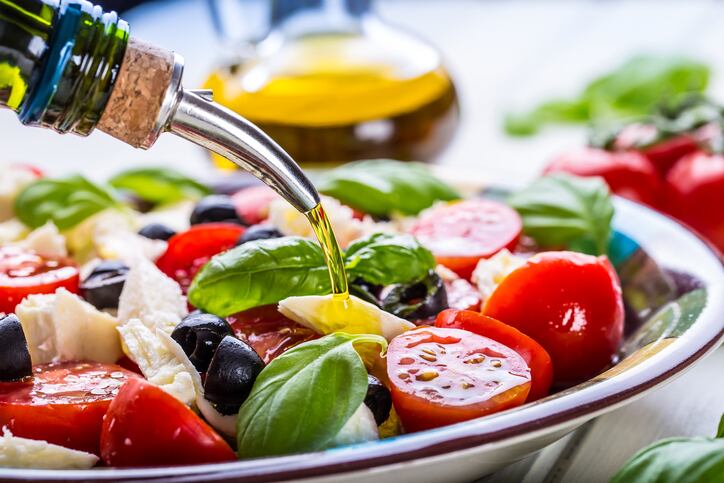“A calorie-restricted green-MED diet enriched with specific polyphenols and decreased red and processed meat consumption may amplify the beneficial effects of a traditional calorie-restricted MED diet on age-related brain atrophy in participants, together with physical activity accommodation, mainly over 50 years of age,” wrote the international team in The American Journal of Clinical Nutrition.
The scientists said these results might suggest “a simple, safe and promising avenue to slow age-related neurodegeneration”.
Elevating the Mediterranean diet
The Mediterranean diet has long been held up as one of the most proven dietary strategies for reducing the risk of heart disease and living a long and healthy life.
Then, in November 2020, a study published in Heart suggested that it could be improved by avoiding red and processed meat altogether and incorporating more polyphenol-rich plant-based foods, such as Mankai (duckweed), green tea and nuts.
In the randomised controlled trial, researchers found that following this ‘improved’ Mediterranean diet for six months resulted in a greater reduction of ‘bad’ LDL cholesterol, diastolic blood pressure and inflammatory markers, compared with following a traditional Mediterranean diet.
This variant on the Mediterranean diet has since been coined the ‘Green Mediterranean diet’.
Brain atrophy and the Mediterranean diet
Amongst its many benefits, the Mediterranean diet has been associated with lower rates of brain atrophy - the loss of brain cells and their connectors, which results in cognitive decline.
A previous clinical trial demonstrated that the Mediterranean diet further supplemented with extra virgin olive oil or walnuts, both of which are rich in polyphenols, might halt age-related cognitive decline. However, there is little intervention trial evidence of slowing age-related atrophy in response to polyphenol consumption, specifically in healthy, middle-aged participants.
18-month brain MRI trial
Therefore, scientists from Ben-Gurion University of the Negev in Israel, together with several international teams of brain experts, set out to test the effect of the Green Mediterranean diet on age-related brain atrophy in an 18-month randomised control trial involving 224 participants recruited from the workforce at the Nuclear Research Centre in Israel.
The volunteers were randomly assigned to three intervention groups: a healthy dietary guidelines (HDG) group, a Mediterranean diet group (MED) and a Green Mediterranean diet group (Green-MED). All groups received free gym membership.
In addition, the HDG group received nutrition counselling to promote a healthy diet. The MED participants were instructed to follow a calorie-restricted, traditional Mediterranean diet low in simple carbohydrates and rich in vegetables, with poultry and fish partly replacing beef and lamb.
The diet included 28g/day of walnuts containing 440mg polyphenols/day. The Green-MED participants were instructed to avoid processed and red meat and were provided with 3-4 cups of green tea per day and a daily green shake of Mankai duckweed as a dinner substitute. Together, these green components provided an additional daily intake of 800mg polyphenols beyond the polyphenol content in the prescribed MED diet.
Whole brain MRI measurements were taken before and after the trial. Hippocampal-occupancy (HOC) and lateral-ventricle-volume (LVV) were measured as indicators of brain atrophy and predictors of future dementia.
Green MED diet linked to lowest decline
After 18 months, 66% of participants exhibited a decline in HOC - indicative of brain atrophy. The change was most marked in the over 50s, of whom 79% exhibited HOC decline. Among the over 50s, the decline in HOC and increase in LVV (indicative of brain atrophy) was less significant in those who had been assigned to the Mediterranean diets. The lowest decline in HOC was observed in those following the Green Mediterranean diet.
“Our main finding shows that the MED and Green-MED diets had more potent effects on HOC and LVV atrophy among older adults than the control condition of HDG,” wrote the researchers.
They said these results are in accordance with previous evidence that lower adherence to the Mediterranean diet is associated with age-related brain atrophy in the elderly.
Mechanisms at work
It is thought that this beneficial association might be partly explained by the abundance of polyphenols in plant-based food sources. This is because polyphenols can cross the blood-brain barrier, reduce neuro-inflammation by inhibiting pro-inflammatory markers and induce cell growth in the hippocampus (a component of the brain that has a major role in learning and memory).
It could also be explained by the beneficial effect of Mankai on glycemic response, which was an essential mediator in attenuating brain atrophy in a previous trial conducted by the same researchers.
They concluded that future studies are needed to explore the exact mechanisms of specific polyphenol-rich foods on brain anatomy and function.
Source: The American Journal of Clinical Nutrition
Published online: doi.org/10.1093/ajcn/nqac001
“The effect of a high-polyphenol Mediterranean diet (GREEN-MED) combined with physical activity on age-related brain atrophy: the DIRECT PLUS randomized controlled trial”
Authors: Kaplan A et al.




